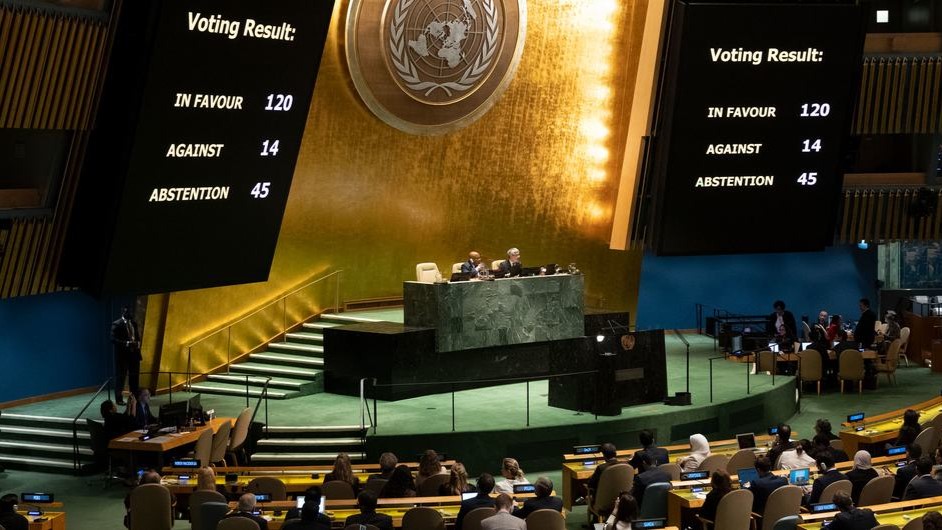After failing several times, the members of the UN Security Council were able to reach a compromise and adopt a resolution on November 15, almost 40 days after the Israeli war began on October 7, demanding “urgent and extended” humanitarian “pauses” in Gaza.
However, as was expected, Israel refused to implement it. Instead it negotiated a deal with Palestinian resistance movement Hamas under Qatar’s mediation and agreed to halt its offensives in Gaza for four days in exchange of hostages.
Israel’s refusal to implement the UN resolution is in line with its record in the last seven decades of completely disregarding the international laws and undermining the mandate of multilateral global institutions.
In Israel’s ongoing war on Gaza since October 7, over 14,100 Palestinians have been killed and more than 30,000 have been injured. Most of the killed, over 70% of them are children, women, and elderly.
The indiscriminate bombing of the besieged Palestinian territory has destroyed almost all of its civilian infrastructure, including the hospitals and water supply, and displaced over 70% of its population.
Weeks before the Security Council adopted a limited and partial resolution, on October 27, the UN General Assembly adopted a resolution demanding an immediate humanitarian ceasefire. Despite the fact that over 120 countries voted in favor of the resolution, Israel’s reaction to it was an arrogant dismissal.
Israeli representative to the UN Gilad Erdan questioned the legitimacy of the global body and referred to the day of resolution’s adoption as a “dark day” in history. He openly vowed that Israel would continue its bombing operations in Gaza despite the resolution asking otherwise.
UN resolutions on the Israeli occupation
Ever since November 29, 1947 when it adopted its infamous partition resolution, calling for the establishment of the state of Israel, UN bodies have adopted hundreds of other resolutions focusing on the right to self determination and other rights of the Palestinian people.
In 1948 after the Nakba, when over 750,000 Palestinians were forced out of their homes, villages, and farms, the UN General Assembly adopted Resolution 194 (III) establishing the right of all Palestinian refugees to return.
One of the architects of this resolution was the UN-appointed mediator Count Folke Bernadotte. He was assassinated by the Zionist militia shortly before the resolution was adopted in December 1948. The newly formed Israeli state let go of all the major accused in his assassination.
The landmark UN Security Council Resolution 242 was adopted on 22 November 1967 asking Israel to withdraw its forces from the territories it occupied during the so-called June war.
Israel remains the occupier of the Palestinian territories, namely West Bank, East Jerusalem and Gaza and Syrian Golan till date.
Israel went ahead and illegally annexed occupied East Jerusalem and Golan in 1980 and 1981 respectively and built illegal settlements and other permanent structures in all these territories.
In 1973, after another war with Arab states, the UN Security Council adopted Resolution 338 on October 22. Apart from asking for immediate ceasefire in the war, the UNSC also reiterated its Resolution 242 adopted in 1967 demanding complete Israeli withdrawal from all occupied territories.
A year later, in 1974, the UN General Assembly adopted yet another Resolution 3236 (XXIX) which reaffirmed the inalienable rights of Palestinian people to self determination, their national independence and sovereignty, and the right of Palestinians to return to their homes and properties.
In the context of the ongoing Madrid peace conference in 1994 the General Assembly adopted another resolution (49/132) calling all Israeli settlements inside the occupied Palestinian territories as illegal and an obstacle to social and economic development of the Palestinians.
Israel refused to take note of the resolution and despite signing a peace accord with the Palestinian Liberation Organization (PLO) in Oslo affirming a “two-state solution,” continued to expand the number of illegal settlements inside the Palestinian territories.
Israel refused to abide by the 2003 General Assembly Resolution 10/13 which called its construction of a separation wall, known as apartheid wall in the occupied West Bank, as illegal and a violation of existing international law.
The General Assembly has taken up the issue of Israeli blockade of Gaza several times in its resolutions since 2006 when it was first imposed. The UN resolutions call the need of adequate and constant supply of essentials as basic needs of all Palestinians and note the deleterious effects of the blockade on Palestinians in Gaza.
Israeli violation of UN resolutions has been the norm
Ever since its formation in May 1948, Israel has not followed any of the UN resolutions on Palestine and the occupied territories, whether passed by the General Assembly or the Security Council.
The resolutions passed by the General Assembly are non-enforceable whereas the resolutions passed by the Security Council are legally binding. Countries can face repercussions if they fail to abide by the resolutions in the form of sanctions or even actual armed interventions.
However, the innumerable resolutions recognizing Palestinian right to self-determination and the humanitarian situation in occupied territories have been completely neglected.
Despite the fact that most of these resolutions identify Israel as an occupying power and admonishes it for violating Palestinian rights. it escapes penalties.
The UN has failed to take any step to make sure its resolutions are implemented by Israel.
The failure of the UN should be attributed to veto holding countries such as the US, France, and the UK standing behind Israel providing it the impunity to commit grave violations of the international laws without fear of any repercussions.





